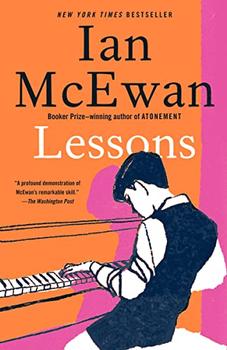Summary | Excerpt | Reading Guide | Reviews | Beyond the Book | Readalikes | Genres & Themes | Author Bio

A novel
by Ian McEwan
To Roland Baines, the sleep-deprived man in the rocking chair, the waking city was no more than a remote rushing sound, swelling with the passing minutes. Rushing hour. Expelled from their dreams, their beds, people were moving through the streets like the wind. Here, he had nothing to do but be a bed for his son. Against his chest he felt the baby's heartbeat, just under twice the rate of his own. Their pulses fell in and out of phase, but one day they would be always out. They would never be this close. He would know him less well, then even less. Others would know Lawrence better than he did, where he was, what he was doing and saying, growing closer to this friend, then this lover. Crying sometimes, alone. From his father, occasional visits, a sincere hug, catch up on work, family, some politics, then goodbye. Until then, he knew everything about him, where he was in every minute, in every place. He was the baby's bed and his god. The long letting go could be the essence of parenthood and from here was impossible to conceive.
Many years had passed since he let go of the eleven-year-old boy with the secret oval mark on his inner thigh. That evening he had examined it after lights out, lowering his pyjamas in the bogs, bending to look closer. Here was the impression of her finger and thumb, her signature, a written record of the moment that made it true. A photograph of sorts. It didn't hurt when he ran his own finger around the borders where pale skin shaded greenish into blue. He pushed down hard, right in the centre where it was almost black. It didn't hurt.
In the weeks that followed his wife's vanishing, the visits from the police and the sealing of the house, he often tried to account for the haunting on that night he was suddenly alone. Fatigue and stress had pushed him back on origins, on first principles, the endless past. It would have been worse if he had known what lay ahead—many visits to a careworn office, much waiting with a hundred others on plastic benches bolted to the floor for his number to be called, multiple interviews pleading his case while Lawrence H. Baines squirmed and babbled on his lap. Finally he won some state aid, a single-parent's stipend, a widower's mite, though she wasn't dead. When Lawrence was one year old, there would be a nursery place for him while his father took up a chair—in a call centre or similar. Professor of Helpful Listening. Completely reasonable. Would he let others toil to support him while he languished all afternoon over his sestinas? There was no contradiction. It was an arrangement, a contract he accepted—and hated.
What happened long ago in a small room by the sickbay had been as calamitous as his present fix but he kept going, now as then, outwardly almost OK. What could destroy him was from the inside, the feeling of being in the wrong. If he had been a misguided child to feel that then, why indulge the guilty feeling now? Blame her, not himself. He came to know her postcards and her note by heart. By convention, such notes were left on the kitchen table. She had left hers on his pillow, like a hotel's bitter chocolate. Don't try to find me. I'm OK. It's not your fault. I love you but this is for good. I've been living the wrong life. Please try to forgive me. On the bed, on her side, were her house keys.
What kind of love was this? Was giving birth the wrong life? It was usually after a serious drink that he fixed on and loathed the final sentence she had failed to complete. Please try to forgive me, she should have said, as I have forgiven myself. The self-pity of the absconder against the bitter clarity of the left-behind, the abscondee. It hardened with each finger of Scotch. Another invisible finger that beckoned. He hated her progressively and every thought was a repeat, a variation on the theme of her self-loving desertion. After an hour of forensic reflection, he knew the tipping point was not far ahead, the pivot in the evening's mental work. Almost there, pour another. His thoughts were slowing and then they abruptly stopped for no reason at all, like the train in the poem that their class had to learn by heart on pain of punishment. A hot day at a Gloucestershire halt and stillness into which someone coughs. Then it would come to him again, the lucid notion as clear and keen as birdsong close by. He was drunk at last and liberated into loving her again and wanting her back. Her remote seraphic beauty, the frailty of her small-boned hands, and her voice barely inflected from a German childhood, a little husky, as though from a bout of shouting. But she had never shouted. She loved him, so the blame must be his and it was sweet of her to tell him in her note that it was not. He didn't know which defective part of himself to indict, so it must be all of him.
Excerpted from Lessons by Ian McEwan. Copyright © 2022 by Ian McEwan. All rights reserved. No part of this excerpt may be reproduced or reprinted without permission in writing from the publisher.
Read the best books first...
Click Here to find out who said this, as well as discovering other famous literary quotes!
Your guide toexceptional books
BookBrowse seeks out and recommends the best in contemporary fiction and nonfiction—books that not only engage and entertain but also deepen our understanding of ourselves and the world around us.